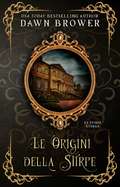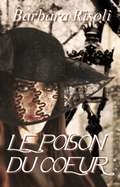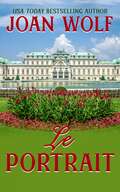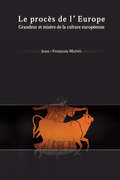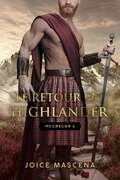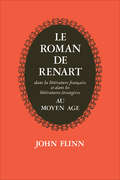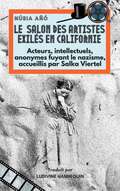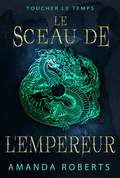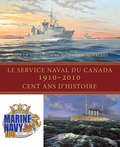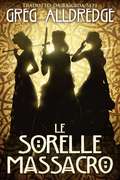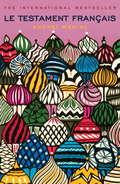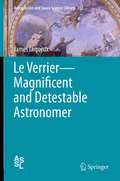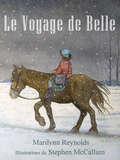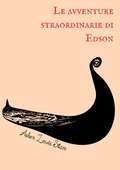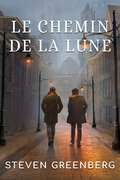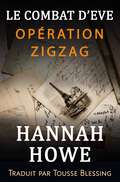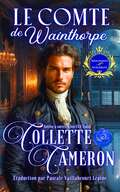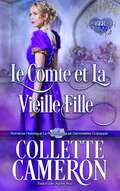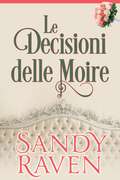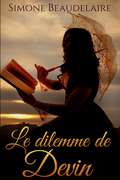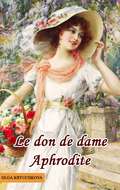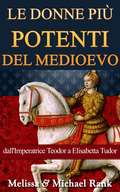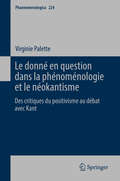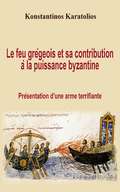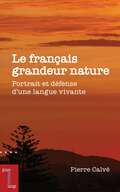- Table View
- List View
Le Origini della Stirpe: Libro primo (La Stirpe Eterna #1)
by Dawn BrowerLe Origini della Stirpe è il primo romanzo della saga della Stirpe Eterna, un racconto che segue le vincende dei discendenti della famiglia Dalais, da sempre depositaria di doni speciali, loro ritengono siano una benedizione, ma nella Scozia del XVI, con la caccia alle streghe che infuria, i fratelli Niall, Sorcha e Caitrìona vengono condannati a bruciare sul rogo, ciononostante la loro eredità non andrà perduta...
Le Poison du Coeur
by Barbara Risoli L BL'été 1788, dans une France pré-révolutionnaire mise à dure épreuve par un rude hiver et dans l'attente de l'assemblée des Etats Généraux qui précèderont la prise de la Bastille. Les protagonistes sont Euphrasie, fille du comte Xavier des Fleuves faisant partie des physiocrates partisans du changement, et Venance, un tueur à gages au passé trouble. Suite au mariage raté de la jeune femme, les deux se rencontrent et un solide lien se crée entre eux et connaitra d'inquiétantes péripéties qui révéleront leurs âmes sans scrupules et prêtes à tout au détriment des autres. La demande d'Euphrasie de mettre en scène son propre meurtre pour échapper au couvent et l'exécution de ce service par le bandit pousseront les deux protagonistes à changer d'identité et à se cacher dans cette France en ébullition, à genou et sous la neige incessante de l'hiver 1788. L'histoire s'articule entre Nanterre, petit bourg proche de Versailles et le Bretagne terrre d'origine des protagonistes. Euphrasie devient la Veuve, une femme toujours cachée derrière le deuil, habile joueuse de hasard et contrebandière d'arme pour la Révolution imminente. Venance se fait passer pour le duc Stolfo Rues d'une lignée inconnue. Une série de coïncidences les font se rencontrer de nouveau, tandis que leur amour se révèle lentement malgré une peur et un refus mutuels. Mais les promesses sont des promesses et...
Le Portrait
by Joan WolfLe père d'Isabel Besson possède un cirque équestre français dans lequel elle a grandi, faisant des tournées dans toute la France et se produisant avec son magnifique cheval, Alonzo. Lors d'une représentation à Londres, Leo Sommers, comte de Camden, est stupéfait lorsqu'il voit en Isabel le sosie de sa célèbre arrière-grand-mère, dont le portrait est accroché dans son salon. Ce n'est pas une coïncidence, car on apprend bientôt qu'Isabel a été enlevée alors qu'elle était bébé et adoptée par "Papa" et sa femme lorsqu'une Anglaise a tenté de leur vendre le bébé. Isabel ne souhaite pas rencontrer sa famille naturelle, mais lorsqu'elle apprend que son père biologique, le comte de Mansfield, lui a laissé une grosse somme d'argent, Isabel voit un moyen pour son papa de se retirer de la vie de cirque, et elle part passer l'été à Camden Hall pour prouver son droit à l'héritage. Camden Hall est l'une des grandes maisons d'Angleterre, et tout ce qui s'y passe semble étranger à Isabel. Son père, le cirque, la France lui manquent... tout ce qu'elle connaît de sa vie. Elle n'aime pas ses nouveaux parents : Lady Augusta, la vieille tante de Leo qui la corrige sans cesse ; Roger, le cousin de Leo, qui l'appelle "fille du cirque" et la déshabille du regard ; son propre frère Henry, comte de Mansfield, qui ne veut pas lui céder l'argent de leur père. Il y a une personne à Camden Hall qu'Isabel finit par aimer... le comte de Camden - et Leo ressent la même chose pour elle...
Le Procès de l'Europe: Grandeur et misère de la culture européenne (Philosophica)
by Jean-François MattéiL’Europe se trouve aujourd’hui en position d’accusée, souvent par les Européens eux-mêmes, du fait de sa prétention à l’universalité, de sa supériorité proclamée et de son arrogance intellectuelle. Qu’elle n’ait pas toujours été fidèle à ses principes, lors de la colonisation des autres peuples, ne met pourtant pas en cause sa légitimité. La critique de l’Europe n’est en effet possible qu’à l’aide des normes juridiques et des principes éthiques qu’elle a diffusés auprès de tous les peuples pour connaître le monde plutôt que pour le juger.Levinas n’avait donc pas tort de louer «la générosité même de la pensée occidentale qui, apercevant l’homme abstrait dans les hommes, a proclamé la valeur absolue de la personne et a englobé dans le respect qu’elle lui porte jusqu’aux cultures où ces personnes se tiennent et où elles s’expriment.» Il faut en prendre son parti : il n’y a pas plus d’égalité des cultures que de relativisme des valeurs. On ne saurait faire le procès de l’universel sans faire appel à la culture qui a donné cet universel en partage aux autres cultures.
Le Retour du Highlander: McGregor 3 (McGregor #3)
by Joice Mascena"Est-il possible d'abandonner complètement un passé tumultueux qui tourmente, même si dans le présent, on a trouvé le bonheur le plus sublime ?" Après son mariage, Edwin aspirait uniquement à fonder une famille. Cependant, tout s'effondre lorsque des fantômes qu'il pensait depuis longtemps oubliés reviennent le hanter. Il doit maintenant retourner là d'où il vient pour tenter de les enterrer une fois pour toutes. Diana a lutté ardemment pour être avec l'homme qu'elle aime, et quand il doit retourner dans son ancien clan, elle ne reste pas en arrière. En découvrant le sombre passé de son mari, ses pires craintes refont surface. Alors qu'ils tentent de résoudre leur situation, un ennemi puissant émerge, menaçant tout ce qu'ils ont construit.
Le Roman de Renart: Dans la littérature française et dans les littérature étrangères au moyen âge (University of Toronto Romance Series #4)
by John FlinnThe Roman de Renart was for long little known, even in France, in its original mediaeval version, but the reputation of the wily fox was widespread, in large measure because of his fame in the Middle Ages. This fame had spread to much of the rest of Western Europe and the stories of Renart had inspired many different literary works in many countries; they were among the earlier published works in Belgium, Holland, Germany, and England. A copious iconography - mediaeval wall-paintings, misereres, architectural carvings, manuscript illustrations, and, later, book illustrations - maintained the frame of the wily fox. Renart, originally a comic but also satirical personage, finally became one of the most popular personifications of the devil in literature and in art.<P><P> This book will interest the specialist in many fields, treating as it does a subject that had ramifications not only in French literature, but also in German, Italian, Flemish and Dutch, English, and mediaeval Latin literature. Interest in the Roman de Renart has increased notably of late, and the iconography of Renart continues to attract attention. For students of English literature the subject of Renart is an important one, first because of the close relationship of mediaeval French and English literature, and also because of Chaucer's charming story of the Nun's Priest Tale, which was largely inspired by the oldest French branch of Renart.
Le Salon des Artistes Exilés en Californie: Acteurs, intellectuels, anonymes fuyant le nazisme, accueillis par Salka Viertel
by Núria AñóUne biographie sur Salka Viertel, une actrice juive qui a immigré à Hollywood et qui était connue comme la scénariste de l'actrice suédoise Greta Garbo. En outre, elle avait un salon à Santa Monica, en Californie, où une grande partie des intellectuels européens en exil avait l'habitude de se rendre. Salka était une femme très moderne et intéressante pour l'époque, qui devrait être connue comme elle le mérite. Dans le livre, des sujets tels que la prétendue bisexualité de Salka Viertel et le nombre d'amis connus qu'elle avait, pour n'en citer que quelques-uns, sont abordés : Albert Einstein, Charles Chaplin, Sergei Eisenstein, F. W. Murnau, Max Reinhardt, Arnold Schönberg, Thomas Mann, Bertolt Brecht, Greta Garbo, Montgomery Clift... De plus, comme Gertrude Stein et d'autres femmes célèbres, elle avait son propre salon littéraire qui vit passer des écrivains tels que Truman Capote, Christopher Isherwood, Gore Vidal, etc. Parmi les autres thèmes, citons Berlin dans les années 1920, le passage du muet au parlant, vu depuis Hollywood. Puis la montée d'Hitler et ce qu'elle a signifié pour les juifs ; l'exil des intellectuels qui ne pouvaient pas retourner dans leurs pays respectifs à cause de la Seconde Guerre mondiale. Plus tard, la guerre froide et la chasse aux sorcières contre le communisme. La vérité est que le contexte de la vie de Salka Viertel et de son cercle d'amis englobe les grands événements du XXe siècle. Pour ce projet, l'auteur a reçu les bourses du Shanghai Writing Program (Chine, 2016) et du Baltic Centre (Suède, 2017). "Un récit très intéressant et même à notre époque, il est très actuel, car à mes yeux, nous n'avons pas beaucoup progressé en matière d'acceptation des "sentiments interpersonnels" en général. Un grand livre, très intéressant, sur Hollywood dans les années trente et quarante et
Le Sceau de l'Empereur
by Amanda RobertsLe sceau de l'Empereur - le divin symbole de l'empereur sur terre - a disparu. L'Impératrice fera tout ce qui est son pouvoir pour le récuppérer. Jiayi a un don. Elle peut voyagé dans le passé en touchant simplement des objets. Mais ce qu'elle veut plus que tout, c'est échapper aux griffes de l'Impératrice et s'enfuir dans un pays lointain. Retrouver le sceau de l'Empereur pourrait être sa chance, mais est-elle prête à riquer la colère de l'Impératrice? Zhihao, histoirien et archéologue, ne porte ni l'Impératrice ni la Dynastie Qing dans son coeur, mais lorsque l'Impératrice lui ordonne de retrouver le sceau en échange du financement du premier musée chinois, il ne peut refuser. Ce n'est qu'après avoir accepter qu'il comprend que la clé pour retrouver le sceau se trouve entre les mains d'une esclave du palais. L'agitation sociale et les puissances étrangères envahissantes menacent la mission et la vie de Jiayi et Zhihao partis à la recherche du Sceau de l'Empereur.
Le Service naval du Canada, 1910-2010: Cent ans d'histoire
by Richard H. Gimblett The Right Honourable Michaëlle JeanLa Marine canadienne a eu 100 ans en 2010, et le Canada a fièrement célébré cet anniversaire. Connue officiellement jusqu’en 1968 comme la Marine royale du Canada, et après comme le Commandement maritime des Forces canadiennes, le service naval du Canada a joué un rôle important dans le développement et la securité de notre pays. Son Excellence la gourverneure générale Michaelle Jean, commandante en chef des Forces canadiennes, a écrit l’avant-propos de cet ouvrage commémoratif richement illustré. Dans cette collection d’articles, tous écrits par d’éminents historiens specialistes de leur période, chaque chapitre est consacré à une période de l’histoire de la Marine: ses origines remontant à 1867, les deux guerres mondiales, la guerre de Corée, la Guerre froide, et sur l’avenir de la Marine ; il y a également un chapitre sur les oeuvres des peintres de guerre. Les auteurs des chapitres font référence à une multitude d’archives et d’ouvrages d’autres auteurs dans leurs écrits. Ce livre se veut un tour d’horizon général qui saura plaire à de nombreux lecteurs, notamment les passionnés de marine, les anciens de la marine et leur famille, les historiens et les bibliothécaires.
Le Sorelle Massacro (Una piccola avventura di Helena Brandiwine #1)
by Greg AlldredgeUno strano mondo: le creature sono più civili degli uomini. Ambientato nell’universo di Helena Brandywime, la storia segue le avventure delle Sorelle Massacro. Gli umani sono diventati più mostruosi delle Creature Leggendarie per cui le donne vengono assunte. Come potrebbe vivere una cercatrice di mostri? Le Sorelle Massacro sono tra le più note cercatrici di mostri nel Nord Est, l’unico problema è che le Creature Leggendarie si mescolano con gli abitanti umani del mondo, mentre i ciarlatani umani prendono il loro posto. Dopo uno scontro con il temuto diavolo del New Jersey, le sorelle devono fuggire dalla loro casa di Yonkers, per sfuggire alla temuta organizzatrice d’incontri locale. Temendo per la loro indipendenza, fuggono a New York City per cercare qualsiasi lavoro disponibile. Scoprono una serie di sparizioni intorno al famigerato Five Points. Chi c'è dietro le persone scomparse, mostri, o esseri umani? Le Sorelle Massacro scopriranno chi c'è dietro tutto questo!
Le Testament Francais
by Andreï Makine Andrei MakineLocked behind the Iron Curtain, a young boy grows up bewitched by his French grandmother’s memories of Paris before the Great War. On her balcony overlooking the Siberian steppes, Charlotte Lemonnier fires her grandson’s imagination with tales of the great flood in 1910, of Proust playing tennis in Neuilly and the President dying in the arms of his mistress, of avenues lined with chestnut trees and elegant cafes.Charlotte’s vision of a paradise lost, though, is overlaid by her subsequent experience. As her grandson grows older, he learns how this remarkable woman survived the Russian revolution’s aftermath, Stalin’s purges and the horrors of the Second World War, gaining from her a portrait of the country drawn with an outsider’s eye. Yet for all the monstrosities of his native land, he realises he is proud to be Russian. Torn between two cultures, as an adolescent he turns his back on all things French. Then in his twenties he abandons the Soviet Union and eventually reaches Paris – where a startling revelation awaits him.This luminous, haunting novel traces a sentimental and intellectual journey that embraces the dramatic history of this century.
Le Verrier—Magnificent and Detestable Astronomer
by James LequeuxTranslated from the original French by Bernard Sheehan; Edited and with an introduction by Dr. William Sheehan, a neuroscientist and amateur astronomer who is also a research fellow of the Lowell Observatory in Flagstaff, Arizona Le Verrier was a superb scientist. His discovery of Neptune in 1846 made him the most famous astronomer of his time. He produced a complete theory of the motions of the planets which served as a basis for planetary ephemeris for a full century. Doing this, he discovered an anomaly in the motion of Mercury which later became the first proof of General Relativity. He also founded European meteorology. However his arrogance and bad temper created many enemies, and he was even fired from his position of Director of the Paris Observatory.
Le Voyage de Belle
by Marilynn ReynoldsBelle est devenue trop vieille et trop raide pour tirer les charrues ou les chariots. Le cheval de Molly ne gagne plus sa pitance qu’en emmenant la jeune fille à ses leçons de piano une fois par semaine. Quand le père de Molly en conclut qu’il est temps de vendre Belle, Molly est ravie à l’idée qu’elle galopera bientôt sur un beau jeune poney. Mais un jour d’hiver, en revenant de ses leçons, Molly et Belle se perdent dans un immense blizzard sorti de nulle part. Et Belle, malgré son âge, affronte la terrible tempête avec une volonté de fer. Quoi qu’il arrive, Belle n’abandonnera pas tant qu’elle n’aura pas ramené sa jeune cavalière à la maison. Le voyage de Belle se passe dans les Prairies canadiennes pendant les années 1920. C’est une histoire émouvante de dévouement sans faille et d’un combat héroïque pour la survie.
Le avventure straordinarie di Edson
by Asher Lewis StamUna novella che accompagna il lettore in un viaggio nel primo Medioevo. Scopri con Edson, il giovane protagonista, il mondo oltre le comodità della tua città e le realtà della natura umana. Sii testimone dell'ideologia della legge e dell'ordine attuata da un popolo lontano. Riesci a trovare somiglianze con alcuni paesi moderni?
Le chemin de la lune
by Steven GreenbergJusqu'où l'amour fraternel peut-il s'étendre ? •GAGNANT : Pinnacle Book Achievement Award, été 2019 - Meilleure fiction littéraire •FINALISTE : Beverly Hills Book Awards 2019 - Fiction historique « ...Une œuvre de fiction historique superbement atmosphérique avec des personnages qui, une fois rencontrés, ne sont jamais oubliés ». ~ K.C. Finn, Readers' Favorite Book Reviews (5 étoiles) Le lien fragile qui unit Samuel et Aron Katz depuis leur enfance est rompu lorsque Aron quitte la Pologne d'avant la Seconde Guerre mondiale pour la Palestine, et encore une fois lorsque Samuel est envoyé dans un goulag soviétique arctique. Aron doit maintenant décider jusqu'où il ira pour sauver son jeune frère. De la Pologne à Tel Aviv en temps de guerre, d'un camp de prisonniers soviétique gelé à l'Iran contrôlé par les Alliés, et au cœur des préparatifs désespérés de la Palestine mandataire contre l'invasion nazie, Le chemin de la lune sonde les liens qui unissent les frères et les sœurs et les forces qui les séparent. « Profondément détaillé, de nature historique et couvrant un voyage aux proportions épiques, Moon Path nous conduit par la main à travers les horreurs de la Seconde Guerre mondiale, avec des personnages sensationnels... Il s'agit d'une lecture intensive, mais vous ne la lâcherez pas d'une semelle. C'est un drame, une histoire, une romance et de l'action à son meilleur, une histoire qui restera avec vous pour toujours ». ~ Anne-Marie Reynolds, Readers' Favorite Book Reviews (5 étoiles) EVOLVED PUBLISHING PRÉSENTE une histoire passionnante qui a pour toile de fond les 200 jours fatidiques de 1942, lorsque les Juifs de Palestine vivaient dans la terreur d'une invasion nazie. L'auteur primé du best-seller Galerie nous livre une fiction historique rythmée et centrée sur les personnages,
Le combat d'Ève
by Hannah HoweLes personnages des combats d’Eve sont fictifs. Cependant, toutes les histoires et les incidents qu’elles contiennent, du personnel au public, sont basés sur des faits réels.Ce livre débute avec un prologue prolongé. Le prologue dans son entièreté couvre les trente premières années de la vie d'Eve et relate son parcours, énumère ses capacités, ses croyances et ses défis.Le combat d’Eve est une série de douze livres, chaque livre ayant environ 20 000 mots et un écart de publication de deux mois. À la fin de chaque livre, vous trouverez des biographies des véritables héros et héroïnes de ces personnages, notamment : Eve Beringar, Guy Samson et Mimi Duchamp (Guy et Mimi interviendront dans le livre deux). Çà été un honneur de lire des histoires sur ces personnes pleines de dignité et essentiellement courageux. J’ose croire que vous serez épris par le parcours et les exploits de mes personnages dans le combat d’Eve.
Le comte de Wainthorpe
by Collette CameronPourrait-elle un jour aimer le débauché impénitent qui l’avait gagnée lors d’un pari ? Il n’a pas parié qu’il allait perdre son cœur en la gagnant aux tables de jeu. Pierce, le comte de Wainthorpe, a finalement vaincu son pire ennemi. Sauf qu’il ne peut pas se réjouir de sa victoire après avoir gagné la pupille de son adversaire dans un pari où le vainqueur remporte tout. Si Pierce refuse d’assumer la tutelle de Bianca Salisbury, la belle aux cheveux de feu et au tempérament tout aussi ardent pourrait très bien se retrouver vendue au plus offrant. Le secret honteux qu’elle garde rend impossible pour elle d’aimer un scélérat. Désespérée d’échapper à son cousin, une fripouille notoire, Bianca Salisbury s’aventure à Londres dans le but de trouver un mari ou un emploi. À la place, elle se fait troquer par son cousin et devient la propriété d’un débauché. Elle a le choix entre accepter la protection du comte de Wainthorpe et risquer d’être compromise, ou fuir celui-ci et son tuteur. Mais sans argent et sans endroit où aller, elle craint de connaître le même sort tragique que sa mère. Afin de protéger Bianca de son cousin, Pierce l’emmène dans son domaine isolé à la campagne. Ni lui ni Bianca ne sont préparés à l’attraction grandissante qu’ils éprouvent l’un pour l’autre, et tous deux redoutent le jour où il retournera à Londres pendant qu’elle restera cachée. Pierce parviendra-t-il à persuader une Bianca méfiante de faire confiance à un voyou réformé, ou s’en ira-t-il, laissant derrière lui son cœur et son amour ?
Le comte et la vieille fille: Romance historique La rose bleue : Les demoiselles Culpepper, tome 1 (Les demoiselles Culpepper #1)
by Collette CameronUn comte en colère. Une célibataire désespérée. Un pari imprudent. Pendant cinq ans, Brooke Culpepper a concentré son énergie sur deux choses: maintenir l'exploitation de la ferme laitière en difficulté qui est sa maison et empêcher sa jeune sœur et ses cousines de mourir de faim. Puis un jour, un inconnu au visage sévère arrive à leur porte et annonce qu’il est le nouveau propriétaire de la laiterie et qu’il envisage de vendre la ferme. Bien qu’elle soit scandalisée, Brooke ne peut pas nier que le comte de Ravensdale fait accélérer son pouls de la manière la plus inquiétante. Heath est furieux de découvrir que cinq femmes appellent chez elles la terre qu’il a gagnée aux tables de jeu. Leur tuteur n’a fait aucune mention de ses belles pupilles pauvres et n’a pas non plus révélé qu’il avait forcé Brooke à lui envoyer le produit de la laiterie ou il les expulserait. Heath déteste tout dans le pays et n’a aucune envie de posséder une ferme malodorante, même si l’une des occupantes est la femme la plus intelligente et la plus envoûtante qu’il ait jamais rencontrée. Désespérée, pauvre et n’ayant nulle part où emmener sa famille, Brooke propose imprudemment un pari. L’enjeu de Heath ? La ferme. Elle ? Sa vertu. La terre n’a aucun intérêt pour Heath, mais il trouve Brooke irrésistible et ignorant la prudence ainsi que son sens de l’honneur, il accepte tout aussi imprudemment son défi. Dans un tel pari, vont-ils tous les deux regretter leur impulsivité, surtout quand l’amour est en jeu ?
Le decisioni delle moire, (Le cronache dei Caversham, racconto breve)
by F. Rossi Sandy RavenSua grazia, la duchessa di Caversham, ha ancora una figlia non sposata dopo quattro stagioni in società, e lo stesso vale per la contessa di Camden e la viscontessa Huddleston. Una caccia alla volpe e una festa in casa nel prossimo autunno, in Scozia, potrebbero essere l'occasione perfetta in cui le loro figlie possano allonanarsi dallo scrutinio dei giornali scandalistici di Londra, e forse incontrare dei gentiluomini adatti che ancora non conoscono. Lia non vuole andare in Scozia, ma pensa che forse Charlotte dovrebbe farlo. Spera che questo possa dare alle ragazze un po' di libertà per esplorare delle potenziali relazioni. Lia dovrà però convincere sua cognata della saggezza del suo piano, e sa che non sarà un compito facile. "Le decisioni delle moire" è un racconto breve che fa da prequel alla nuova generazione delle storie della famiglia Caversham, "I titani della rivoluzione". Alla fine del racconto troverete l'anticipazione del primo capitolo di "L'amore predestinato", il primo volume della serie che uscirà nell'autunno 2016.
Le dilemme de Devin
by Simone BeaudelaireBrighton, Angleterre, 1856. Pour Devin Bennett, notaire débutant, rien n'est plus important que de faire avancer sa carrière. L'amour et le futur ne font pas partie de ses préoccupations quotidiennes. Puis, il rencontre Harry. Femme de chambre et chaperonne de la fille du client de Devin, Harry est intelligente, captivante et occupe les pensées du jeune homme jour et nuit. Mais Devin sait qu'Harry lui cache quelque chose, un secret qui pourrait les séparer et envoyer Harry à l'autre bout du monde...
Le don de la dame Aphrodite
by Fotsing fils de Fongang Olga KryuchkovaLe don de dame Aphrodite est une histoire d'amour entre une fille d'un noble russe âgée de 18 ans et un hussard sans le sou (les hussards étaient des cavaliers légers dans l'armée impériale russe au 19e siècle). La fille ne veut pas épouser un homme que ses parents ont trouvé pour elle — un riche et haut fonctionnaire âgé de quarante ans de plus que la fille. Elle essaie en vain de forcer son père à annuler le mariage. Le brave hussard kidnappe la fille et l’épouse. Par chance, le comte déshonoré s'avère être un proche parent du hussard, et l'oncle se réconcilie rapidement avec son jeune neveu, qui est en même temps son héritier bien-aimé. Ce livre est destiné aux femmes de tout âge.
Le donne più potenti del Medioevo: dall'Imperatrice Teodora a Elisabetta Tudor
by Michael Rank Debora Serrentino Melissa RankL'idea di una donna potente nel Medio Evo sembra un ossimoro. Le donne dell'epoca sono immaginate come damigelle in pericolo, intrappolate in un'alta torre, in attesa di un cavaliere che le salvi, il tutto mentre indossa un cono per cappello. Dopo il salvataggio la loro vita migliora di poco. Le loro scelte di carriera andavano da docile regina, moglie o essere bruciate sul rogo per stregoneria. È se questa immagine delle donne medievali fosse del tutto immaginaria? Si scoprirà che lo è. Sovrane potenti riempivano il Medio Evo. Ethelfleda condusse personalmente gli eserciti in battaglia contro i vichinghi e salvò l'Inghilterra dall'invasione straniera. L'imperatrice Teodora impedì all'Impero Bizantino di sgretolarsi durante ribellioni su ampia scala e impedì al marito e al suo concilio di fuggire da Costantinopoli. Caterina da Siena ripristinò praticamente da sola il papato a Roma nel 1300 e viaggiò nel modo brutale e dominato dagli uomini della politica italiana. Giovanna d'Arco capovolse completamente le fortune della Francia nella Guerra dei Cento Anni e comandò gli assalti contro le fortezze inglesi nonostante fosse una contadina analfabeta di 17 anni. Questo libro osserverà le vite di queste dieci grandi donne del Medioevo. Che si tratti della nota studiosa Anna Comnena, di Margherita I di Danimarca, che unificò la Scandinavia, o della regina madre ottomana Kösem Mähpeyker, che governò l'impero islamico tramite i suoi tre figli, tutte queste donne hanno avuto livelli straordinari di potere in un periodo in cui si riteneva che le donne non ne avessero alcuno. Si guarderà a come sono riuscite ad ottenere il potere, cosa ha reso il loro traguardo così degno di nota e l'impatto che ha avuto nelle rispettive società la loro morte. Verrà inoltre descritto il contesto storico di queste donne, la loro cultura e cosa di questi due aspetti abbia aiutato o intralciato la loro ascesa. Le loro storie riecheggiano anco
Le donné en question dans la phénoménologie et le néokantisme
by Virginie PaletteCet ouvrage explore les critiques du donné dans le néokantisme et la phénoménologie allemands. Il révèle la portée considérable de ces critiques, qui impliquent en même temps une controverse avec le positivisme de la fin du XIXème siècle et un dialogue substantiel avec l’Esthétique transcendantale de Kant. En posant les questions de la sensation et de la perception, la présente monographie permet de ménager un accès privilégié aux enjeux fondamentaux de la philosophie austro-allemande au tournant du XXème siècle. Lorsqu’il est question du donné ou des critiques du donné dans le discours philosophique contemporain, et cela arrive souvent dans les débats sur la perception en philosophie de l’esprit, c’est toujours à la controverse analytique autour du « mythe du donné » que l’on fait référence – controverse, qui a vu le jour en 1956, lorsque le philosophe américain Wilfrid Sellars publie Empirisme et philosophie de l’esprit. Or, il est intéressant d’observer que la critique sellarsienne du « mythe du donné » a été préfigurée, en un sens partiel mais important, par les objections que les néokantiens et les phénoménologues ont adressées à la notion de donné au tournant du XXesiècle. La présente monographie comble cette lacune béante de l’historiographie classique, qui a jusqu’ici accordé peu d’attention à la constance de cette critique dans toutes les philosophies marquées par l’héritage de Kant.
Le feu grégeois et sa contribution à la puissance byzantine: présentation d’une arme terrifiante
by Konstantinos Karatolios Naïma Paradis JoyalLa grandeur millénaire de l’Empire byzantin aurait été impossible sans la contribution de ses forces armées. Grâce à elles, il a pu maintenir une position de force par rapport aux défis constants que lui faisaient subir ses rivaux. À cet égard, l’héritage des Romains est aussi important que l’adoption de nouvelles armes et tactiques de combat. Le feu grégeois, s’il n’est pas l’arme principale de ces forces, est certainement celui qui a atteint la plus grande renommée. Utilisé tout au long de l’ère byzantine, il a consenti de retentissantes victoires à sa marine. Cette arme terrifiante relève presque de la légende, car pratiquement tout ce que nous en savons aujourd’hui est assombri par l’ambiguïté des documents d’époque. Dans cet ouvrage, Konstantinos Karatolios tente de répondre à une série de questions concernant le feu grégeois : quelle était sa composition? À quel point était-il efficace? Qui l’a réellement inventé? Comment était-il utilisé lors des combats terrestres et maritimes? Cet ouvrage vise d’abord à fournir au lecteur non averti une vue d’ensemble sur l’état actuel des recherches. Ensuite, son objectif est d’apporter sa propre contribution sur le sujet, tout en respectant la méthode scientifique.
Le français grandeur nature: Portrait et défense d'une langue vivante (Essais et fiction)
by Pierre CalvéLe français est probablement la langue la plus surveillée, réglementée et critiquée sur terre. Celui parlé au Québec et dans le reste de la francophonie canadienne l’est d’autant plus qu’il a longtemps été considéré comme le parent pauvre et fautif de la langue prétendument utilisée en toutes circonstances par une certaine élite de la société française.Dans une vingtaine de textes illustrés de nombreux exemples, Pierre Calvé brosse un portrait aussi fidèle, réaliste et objectif que possible du français en tant que langue vivante et qui varie naturellement dans le temps, dans l’espace et dans la société. Les sujets abordés sont diversifiés et accessibles aux non spécialistes : les caractéristiques de la langue parlée au quotidien, les registres de langue, la remise en question des normes du « bon usage », les critères d’acceptabilité sociale et linguistique, les recommandations souvent discutables des « gardiens » de la langue, ainsi que des thèmes comme les anglicismes, l’insécurité linguistique et la complexité de l’orthographe.Le français grandeur nature comble un vide entre les connaissances traditionnelles acquises lors de l’apprentissage scolaire du français (surtout écrit) et celles que devrait avoir tout francophone sur cette magnifique langue qu’est le français dans toute la richesse de sa diversité.
